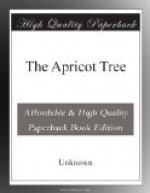This evening, when Ned repeated his texts, he felt that he had been wrong to rejoice at Tom Andrews’s disgrace, because he had behaved ill to himself; and he prayed God to make Tom see his faults, and leave off his bad ways.
The next day Ned, as usual, went early to his work. Tom Andrews was very teasing, but Ned tried not to be provoked; and when Tom said ill-natured things to him, he checked the angry replies he was tempted to make. Two days afterwards, when Ned came home to tea, he thought with pleasure that to-morrow was market-day at the town where Mr. Stockwell lived; and he ran in and out twenty times, to look at, and admire, his beautiful apricot-tree. “I must get up very early indeed to-morrow morning,” he said to his grandmother, “that I may gather the apricots, and take them to Mr. Stockwell before I go to my work.” Accordingly the next morning he rose as soon as it was light, and, taking a basket the greengrocer had lent him in his hand, went into the little garden to line it with fresh green leaves, before putting the fruit into it.
What was his surprise and sorrow when he saw that every one of his apricots was gone, and the tree itself sawn nearly in two, close to the root!
Throwing down his basket, Ned ran to his grandmother, who was just come down stairs, and had begun to light the fire.
He could only exclaim, “O my apricots, my apricots, they are all gone! And my beautiful tree—” then covering his face with his hands, he burst into tears.
“What is the matter, my dear?” inquired his grandmother.
Ned replied by taking her by the hand, and leading her into the garden.
“Who can have done this?” he exclaimed, sobbing. “If they had only stolen the apricots, I could have borne it better! But to see my dear tree spoiled—It must die—it must be quite killed—only look how it is cut!”
“I am very sorry for you, my poor boy,” said his grandmother, kindly. “It is a most vexatious thing.”
“Oh!” cried Ned, “if I did but know who it was that had done it—”
“I would be revenged on them, some how or other,” he was going to have added; but the texts which he had learned a few days before concerning the forgiveness of injuries, and which he had frequently repeated to himself since, came into his mind, and he stopped short.
On looking round the garden, to see if they could discover any traces of the thief, Ned and his grandmother saw the prints of a boy’s shoe, rather bigger than Ned’s, in several of the beds, and hanging on the quick-hedge were some tattered fragments of a red cotton handkerchief checked with white. “I know this handkerchief,” said Ned; “it is Tom Andrews’s; I have often seen him with it tied round his neck. It must be he who stole my apricots.”
“You cannot be sure that it is Tom who stole your apricots,” rejoined his grandmother. “Many other people besides him have red handkerchiefs.”




